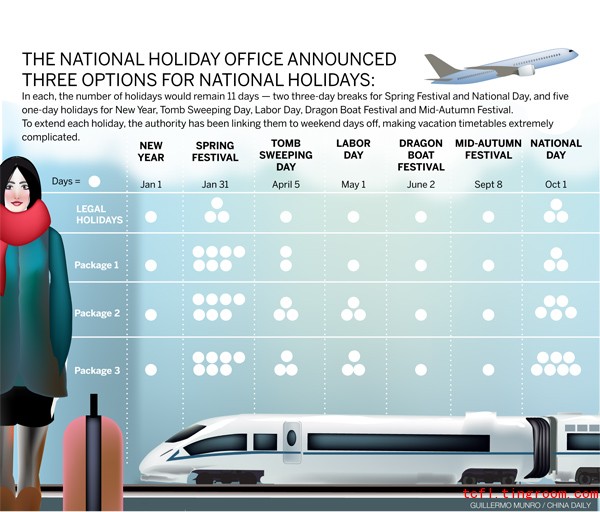
The latest options the national holiday authority has put forward for public comment have provoked dissatisfaction among netizens, who are calling for more holidays.
On Wednesday, the national holiday office announced three vacation options, on which they sought public comment.
In each option, the number of legal holidays would remain at 11 days — two three-day breaks for Spring Festival and National Day, and five one-day holidays for New Year, Chinese Tomb Sweeping Day, Labor Day, Dragon Boat Festival and Mid-Autumn Festival.
To extend each holiday, the authority has been linking them to weekend days off, making vacation timetables extremely complicated.
For example, this year, Mid-Autumn Festival fell on Thursday, Sept 19, and National Day holidays started on Tuesday, Oct 1. To extend both breaks. the authority added regular weekend days off from Sept 22,29 and Oct 12, and required people to work those days.
"My work timetable was like this: three day's work, three day's leave, six day's work then one day's leave. Two day's work, seven day's leave, five day's work and one day's leave. I am so sick of the holiday schedule, and it was too complicated and broken up for any travel plans," said Zhu Yong, 27, a Beijing resident.
As that schedule caused controversy across the country, the national holiday office decided to seek comments on alternatives from the public.
In the three options for the 2014 holidays, Spring Festival is still joined with weekend days off to form a seven-day holiday, while the options for National Day are a three-day, five-day or seven-day break.
The suggestions, however, only provoked more complaints.
"The package does not make sense in any aspect because it fails to increase the total number of holidays. Now we have as few as 11 legal holidays in a full year, and the authority said it is seeking opinions from people by allowing us to choose from three similar options. What we really want is more holidays," wrote a netizen using the name wodui fangjia bumanyi (literally, "I am dissatisfied with the holiday schedule"), on the bulletin board of people.com.cn.
"For people like me who work and live in a different city to my family, I prefer the government combine all 11 days together at Spring Festival, so the holiday is long enough for me to travel back and forth," said another netizen, using the name zhixiang fangge shufujia ("I just want a comfortable holiday).
However, experts said the national holiday office has no authority to increase the number of holidays, and the best solution is to instead ensure people have paid vacations from their employers.
"The State Council published a regulation on China's holiday system that stipulated 11 legal holidays every year, and the national holiday office's responsibility is only to adjust the weekend holidays according to that," said Cai Jiming, director of the Center for Political Economy at Tsinghua University. Cai leads a team researching holiday system reform.
The national holiday office is an inter-ministerial group that includes intermediate officials from several ministries including the National Development and Reform Commission, the Ministry of Transportation and the Ministry of Public Security.
Cai also said 11 national holidays is not too few.
"I have carried out research on 60 countries' holiday systems, and China's national holidays are neither the best nor the worst," he said.
"This is the first time that the national holiday office has solicited people's opinions since 2008, so it has started recognizing the chaos brought about by diverting weekend breaks."
Cai said that the long holidays have led to too many tourists in a short period of time and other problems.
"The national legal holidays are for people to remember traditions, rather than traveling. Relative departments should ensure that more people have paid vacations they will lower their expectations of the festival vacations," he said.



